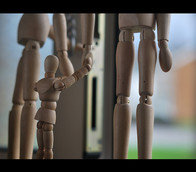|
I was asked to write a blog post for the National Eating Disorder Information Centre (NEDIC). Here is the link:
http://nedic.ca/blog/book-hope-our-shared-story
2 Comments
Denial is a powerful protector. It shields us from things we feel are too frightening or too dire to face. For some people, denial seems as essential as oxygen; it helps them cope with a life that seems too stressful to face. But, in the case of eating disorders, denial can delay treatment which can, in turn, have devastating affects on the chronicity of the illness. Delaying treatment can also result in severe medical emergencies or even death.
So clearly, we all have a duty to contact parents if we witness warning signs of eating disorders. However, for some cultures and some families, mental illness is simply not acceptable. It creates extreme feelings of stigma and shame. It may be seen as a sign of their failure as parents. There may be a great deal of concern over what this "label" will do to their child's social standing or academic/career prospects. It may be personally excruciating for parents to face. And, research has shown that human beings are notoriously good at finding proof for the theory we support. So, parents who have a perfect, straight-A child, with a high commitment to fitness and health, will be hard pressed to believe that an eating disorder is likely. They may point to the fact that she/he always eats breakfast. She/he exercises regularly. She/he is getting great marks in school. They may dismiss the authority of the person who is bringing forward the concern. ("You aren't a doctor. You don't know my child.") In short, they may deny any "proof" that doesn't line up with their preconceived view. We believe what we want to believe. So, does all this mean that educators and concerned bystanders should keep their nose out of other people's business and avoid the potential conflict? I say no. I think we have a responsibility to step forward when we see a child's health and well-being in jeopardy. We need to quell our own fears about how the conversation will go, and initiate anyway. Here are a few pointers on how to help make the conversation a bit easier: -Pick a quiet, private time to initiate the conversation. Make sure you have enough time to serve it justice. -Give the family the heads up that you have concerns about the student/child's health and well-being. - Adopt a collaborative, open, kind, compassionate attitude. - Watch for language that could be seen as accusatory, authoritative or judgmental. - Expect (and be ready for) a wide variety of responses, including denial, rationalization, anger, shock or sadness. - Reflect back to the parents that this must be alarming news. (It's typical for parents not to know what is going on during school hours). - Remain calm if they deny, dismiss or try to end the conversation. - State the specific behaviours you have witnessed. Be clear with your language to avoid confusion or misunderstanding. - State (and restate) your concern for the child/student's health and well-being. (You may want to include some information here about the dangers of eating disorders). - Ask if they know where to go to find additional help (including accurate medical assessment, counselling, treatment, etc) - Suggest they visit EDSNA's website to find out more. (including lists of options, the SCOFF questionnaire to screen for eating disorders, support groups, facts, books, etc.) - Ask them if they have support within their community, or family, to draw upon. (This may also be the time that you will get a feeling of how "acceptable" mental illness is for them and their community.) - Offer to put them in touch with EDSNA or other supports. People often have no idea where to turn. - Keep the door open for future conversations. You may not be able to convince them, but if enough people express the same concern, eventually, the message will sink in. Be clear that your door is always open. I would suggest also having a similar conversation with the student/child to determine if they may be interested in seeking support or treatment. Sometimes, youth are just waiting for an adult to notice, to care and to throw them a lifeline.  In my book, most of the families talk about the challenges of finding people within the healthcare system who are trained in eating disorders. One dad related a terrifying example of an emergency doctor who didn't know that low heart rate is a common side effect of anorexia. The doctor kept asking what the child's heart condition was and dismissing that it was related to her eating disorder. Here are his words (page 27): It's scary, even doctors... doctors don't even know enough about this! Because when Cassie initially started having all the heart problems and her heart rate went down to 32 beats a minute, I remember being at the hospital in Rocky and we kept saying, "She's got an eating disorder" and the doctors had no idea what we were talking about. It's scary. I remember being very firm with one doctor and saying, "No we need to get her to Edmonton." He had no clue about the eating disorder clinics in Edmonton and the one in Calgary--- we had to educate the doctors. We just about lost her; it scared the living daylights out of me. Since writing the book, I've heard many other frightening stories. One mother was told, "Don't worry. Boys don't get eating disorders." Another parent was told her child's dramatic and sudden weight loss was no big deal because his BMI was okay, so he was "probably overweight to begin with". This was said in front of her child who was refusing to eat! Other families have been told, "Well, she just needs to eat. If she eats, she'll be fine. " and sent out of the office with no further instruction. Three years ago, our 14-year old daughter left her second appointment with a GP (which confirmed her rapid and uncontrolled weight loss), with a prescription for Prozac in her hand and the promise of a follow up call from a dietician. Baffled that a 14-year old would be given a prescription for an anti-depressant without involving the parent, I asked the nurse if I could speak to the doctor. I was told the doctor was not available and I needed to make a separate appointment. I didn't go back. Instead, I immediately began seeking treatment for our daughter and was lucky enough to get her admitted quickly in the Eating Disorder Clinic at the University of Alberta Hospital. Weight restoration was difficult, painful and slow for our daughter, even with a whole team of skilled professionals at her side. Four months later, the phone rang and a woman, identifying herself as a dietician, asked to set up an appointment for our daughter. I was confused, as our daughter had weekly appointments with a dietician at the hospital, so it took me a while to figure out that this was the referral from the GP. At the four month mark, my daughter was only just beginning to get out of the woods. I was livid and tore a strip off this poor, unsuspecting woman: "You are calling me NOW? Do you realize how critical my child would be if I'd been waiting for this call?!" In truth, she could have easily died. Anorexia has the highest mortality rate of any mental illness and somehow this doctor had failed to recognize the gravity of the situation. At first I was angry about this incidences. But in my role as Executive Director for EDSNA, I've had the opportunity to chat with doctors, PCN nurses and dieticians. I realize that they have received very little (or no) training in eating disorders. It is a gaping hole in our medical training and hopefully something that can address. EDSNA has submitted a proposal to the Field Law Community Fund for a one-day symposium to help share best practices. You can learn more about this idea and VOTE for our proposal by visiting: http://fieldlawcommunityfund.com/idea/ed-ucate/ In the meantime, it's important for parents and caregivers to be armed with knowledge. As part of the Children's Mental Health Symposium, I will be giving a webcast presentation on June 16, which is free and will be available all across the province. In it, I will touch on ways to work with health care professionals and provide a step by step guide for that first doctor's appointment. It is free and you can sign up here. If you are a healthcare professional wanting to learn more, I highly recommend this video, created by the American Medical Association on the role of the primary care doctor in screening for and being informed about eating disorders. All healthcare professionals and parents should know about the SCOFF Questionnaire. It's a simple screening tool which has been proven 100% effective in screening for bulimia and anorexia. When healthcare professionals and families work together, we can all shed more light on eating disorders. Writing Book of Hope was a journey of understanding. I started blind, scared, rigid and defiant. By the time it was published my eyes were open, my panic had subsided and my heart was much softer. I was so grateful to have the guidance of those families, a little further down the path, saying, "Come on, this way, you can do it." They reassured me that there was indeed light at the end of the tunnel, even if I could only see it as a pinprick. As a way to thank them for their generosity and courage, I now work for Eating Disorder Support Network of Alberta (EDSNA) which aims to support people affected by eating disorders through every stage of recovery. At EDSNA, we offer words of encouragement. We build safe places to share without judgment. We offer solid information to help people find their footing. We listen. We offer hope. Because recovery is possible. |
Sue's blog:
|
Proudly powered by Weebly

 RSS Feed
RSS Feed